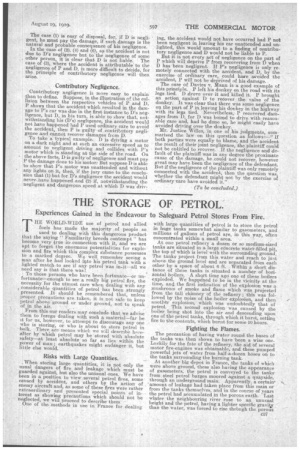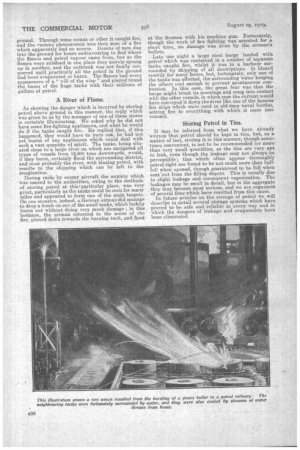THE STORAGE OF PETROL
Page 15

Page 16

If you've noticed an error in this article please click here to report it so we can fix it.
Experiences Gained in the Endeavour to Safeguard Petrol Stores From Fire.
THE WORLD-WIDE use of petrol and allied fuels has made the majority of people so used to dealing with this dangerous product that the saying " Familiarity breeds contempt" has become very true in.conneetion with it, and we are apt to forget the enormous potentialities for explosion and fire 'which this complex Substance possesses to a marked degree. We well remember seeing a man after he had looked into his petrol tank with a lighted match-.to see if any petrol was in.it—all we
need say is that there was . To those persons who have been fortunate—or unfortunate—enough' to see a really big petrol fire, the necessity "for the utmost care when dealing with any considerable quantities of petrol has been strongly ! presented. It should be remembered that, unless proper precautions are, taken, it is not safe to keep petrol above ground or under ground, not to speak of in the air. . • From this our readers may conclude that we advise them to forego dealing with such a material—far be it for us, however, to attempt to discourage any one who is storing, or who is about to store petrol in bulk. There are means which we will deserib'e hereafter by which petrol may be stored with absolute safety—at least absolute so far as lies within the power of man ; earthquakes might endanger it, but little else would.
Risks with Large Quantities. ....
. When storing large quantities, it is not only the usual dangers of fire and leakage which must be guarded against, but also the unusual ones. We have been in a position to view several petrol fires, seine' caused by accident, and others by the action of enemy aircraft and, as some of these fires were rather extraordinary and presented special points of interest as showing precautions which should not be neglected, we will proceed to describe them.
One of the• methods in use in France for dealing with large quantities of petrol is to store the petrol in huge tanks somewhat similar to gasometers, and millions of gallons of petrol are, in this way; often concentrated within a small area. • •
At one petrol refinery a dozen or so medium-sized • tanks are situated in a large ccinerete wateer-filled pit, the top of -which is level with the surrounding ground. The tanks project from this water and reach to just above the ground level and are separated from each other by a space Of about 6 ft. Within a short distance Of these tanks is situated a number of horizontal boilers. A shirt tune ago one of these boilers exploded. We happened to be in the vicinity at the time, and the first indication of the explosion was a mushroom of smoke and flame which was projected -from the tall chimney of the refinery ; this was followed by the noise of the boiler explosion, and then another exploSion, which was undoubtedly that of petrol. This, second explosion was caused by the boiler being shot into. the air and descending upon one of the petrol tanks, through which it burst, setting fire to the contents, Which burnt for sonic 10 hours.
Fighting the Flames.
The precaution of having water round the bases of the tanks was then shown to have 'been a wise one. Luckily for the fate of the refinery, the aid of several motor fire-engines was obtainable, and these pumped powerful jets of water from half-a-dozen hoses on to the tanks surrounding the burning tank.
At another big depot in France, the tanks of which were above ground, these also having the appearance of gasometers, the petrol is conveyed -0 the tanks from steel petrol barges moored against a quayside, through an underground main. Apparently, a certain. • amount of leakage had taken place from this main or from the tanks themselves,and in the course of years the petrol had accumulated in the porous earth. -Last winter the neighbouring river rose to an unusual height arid the petrol, having a lighter specific gravity than the water, was forced to rise thrliugh the porous ground. Through some means or other it caught fire, and the eurious phenomenon was then seen of a fire which apparently had no source. Dozens of men dug into the g-round for hours endeavouring to find where the flames and petrol vapour came from, but as the flames were subdued in one place they merely sprang up in another, and the outbreak Was riot finally conquered until practically all the petrol in the ground had been evaporated or burnt. The flames had every appearance of a " will of the wisp" and played round the bases of the huge tanks with their millions of gallons of petrol. _
A River of Flame.
As showing the danger which is incurred by storing petrol above ground in this manner, the reply which was given to us by the manager of one of these stores is certainly illuminating. We asked why he did not have some fire-fighting appliances, and what he would do if the tanks caught fire. He replied that, if this happened, they would have to burn out, he had not yet learnt of any appliances which could deal with such a vast quantity of spirit. The tanks, being situated close to a large river on which are navigated all types of vessels from 12,000 tons downwards, would, if they burst, certainly flood the surrounding district, and most probably the river, with blazing petrol, with results to the shipping which can be left to the imagination.
During raids by enemy aircraft the anxiety which was caused to the authorities, owing to the methods of storing petrol at thistparticular place, was very great, particularly as the tanks could be seen for many miles and appeared to form one of the main targets. On one occasion, indeed, a German airman did manage to drop a bomb on one of the small tanks, which luckily burnt out without doing very mueh damage ; in this "instance, the airman returned to the scene of the fire, planed down towards the burning tank, and fired
at the firemen with his machine gun. Fortunately, though the work of fire fighting was arrested for a abort time, no damage was done by the airman's bullets.
Late one night a large steel barge loaded with petrol which was contained in a number of separate tanks caught fire, whilst it was in a harbour surrounded by shipping of all descriptions. It blazed merrily for many hours, but, fortunately, only one of the tanks was affected, the surrounding water keeping the others cool enough to prevent spontaneous combustion. In 'this case, the great fear was that the barge might break its moorings and comp into contact with the other vessels, in which case the current would have conveyed it down the river like one of the famous fire ships which were used in old-time naval battles, setting fire to everything with which it came into contact.
Storing Petrol in Tins.
It rouy be inferred from what we have already written that petrol should be kept in tins, but, as a matter of fact, storing it in this' manner, though sometimes convenient, is not to be recommended tor more than very small quantities, as the tins are very apt to leak, even though the leakage may not always be perceptible ; tins which often appear thoroughly petrol-tight are found to be not much more than halffull when opened, though guaranteed to be full when sent out from the filling depots. This is usually due to slight leakage and consequent vaporization. The leakages may be small in detail, but in the aggregate they may become most serious, and we are cognizant of several fires which have resulted from this cause.
In future articles on the storage of petrol we will describe in detail several storage systems which have proved to be safe and reliable in every way and in -which the dangers of leakage and evaporation have been eliminated.






















